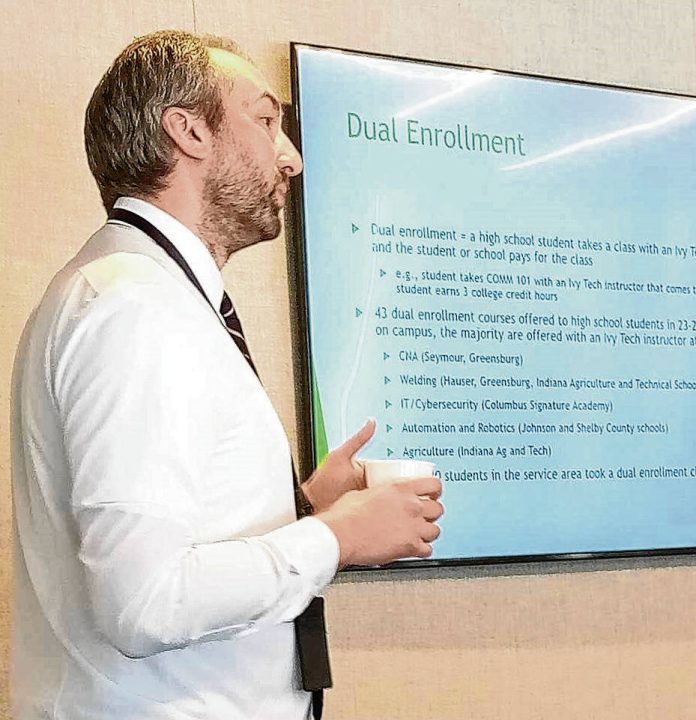
Billy Harmon, director of K-14 initiatives at Ivy Tech Columbus, presents details about the region’s growing number of high school students enrolled in dual credit courses during a March 19 board meeting.
Dave Stafford | The Republic
High school students in Bartholomew County and their families have potentially saved more than $1.1 million in college tuition this school year, even though some might not realize it.
Moreover, those are just the savings that would be realized by students taking dual credit courses offered through Ivy Tech Columbus if those credits were applied at Ivy Tech. The transferable credits could be worth much more in future tuition savings if they were applied at a four-year public or private college or university.
Those were among the takeaways of a presentation on Ivy Tech’s dual credit courses recently by Billy Harmon, director of the school’s K-14 initiatives. Harmon told the Ivy Tech Columbus Region Board of Trustees that dual credit enrollment has been steadily increasing in recent years.
“Big takeaway for dual credit is … Ivy Tech dual credit’s free to high school kids,” he said. “That creates college access for those kids that think they don’t have it.”
And each credit a student earns is worth hundreds of dollars in tuition savings at Ivy Tech, perhaps thousands if later transferred to a more expensive school. For instance, Harmon said a student taking a dual-credit speech class in high school will also earn credit for Ivy Tech’s COMM 101 course, saving $560.
“You can make that it a thousand bucks for the average public college, or two or three thousand for the average private college,” Harmon said.
The dual credit courses offer high school students the opportunity to take one course that offers both high school and college credit. While some are taught at Ivy Tech locations, Harmon said the majority are taught in local high schools.
In Ivy Tech’s Columbus service area this academic year, Harmon said 5,563 students are enrolled in dual credit courses, up 500 students from dual credit enrollment last year. “I think we can break 6,000 next year,” he said.
The current year’s dual-credit enrollment includes:
- 551 students at Columbus North High School, earning credits worth $545,840 if applied at Ivy Tech.
- 355 at Jennings County, earning credits worth $374,4949.
- 345 at Columbus East, earning credits worth $345,752.
- 147 at Hauser, earning credits worth $98,896.
- 130 at Columbus New Tech, earning credits worth $116,583.
- 18 at Columbus Christian, earning credits worth $14,371.
Course offerings vary by school depending on qualified instructors, but they range from core academic courses to cybersecurity to welding.
“They’re in a position where they can finish a credential by the time they graduate high school,” Harmon said of dual credit students.
“Right now, this year, we have 222 credentialed dual-credit teachers in our service area — they teach 538 dual credit courses,” Harmon told the board. “Those are big numbers,” he said, but finding qualified teachers is a challenge. He noted that depending on the classes, teachers may require certification beyond a master’s degree.
Those teachers, he said, “could teach the same class on a college campus if (they) wanted to, and … some do that.” The dual credit programs are offered in 25 high schools, three career centers and more across the six counties in Ivy Tech Columbus’ service area, which includes Bartholomew, Decatur, Jackson, Jennings, Johnson and Shelby counties.
The number of students enrolled in dual credit courses in the region this year places the Columbus service area fifth in the state, behind the larger, densely populated metro regions in Ivy Tech’s Fort Wayne, South Bend, Indianapolis and Valparaiso service areas, Harmon said.
“We’re right behind them, we’re right with them,” he said. “So really impressive.”
Board member Chris Hoke noted that dual credit courses ensure that a student passing the course will earn Ivy Tech credit, unlike Advanced Placement courses. He noted colleges and universities have discretion about whether they will award credits based on a student’s performance in an AP class in high school.
But Hoke, who is superintendent of Northwest Consolidated School District in Shelby County, also noted a problem he’s seen with dual-credit courses: “Percentages will vary whether kids understand they’re really in a dual credit” course. He said he’s seen instances in which students noted the difficulty of a class only to learn later that the class was tougher because they were earning Ivy Tech credit.
Some board members said they also wished more students understood the value of earning college credits in high school at no cost.
“I don’t know if there’s any 17- or 18-year-old kid, including when I was 17 or 18, that fully understood the financial impact” of earning college credit while in high school, Hoke said. “That’s a constant struggle. … Somebody comes up with an answer to that, let me know.”




